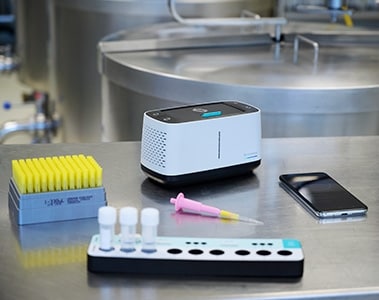
Fermented food for thought: enjoy it all
09 Aug 2022
Global milk production is on the rise, with most of that produced being further processed into cheese and fermented milk products (FMPs). In an increasingly competitive landscape, dairy producers must ensure their products are of the highest quality to stay ahead in the market. One of the many challenges facing producers of cheese and FMPs is bacteriophage (phage); viruses that infect and destroy the lactic acid bacteria needed in the production of yogurt and cheese. Phages can slow down fermentation, which can negatively impact the flavor, yield and texture of dairy products.
There are different types of phages found worldwide, which can easily transfer from one place to another via air, equipment or people, particularly through dairy factories. If a phage finds a suitable bacterial host, it infects the host and then quickly proliferates. Unfortunately, once phages enter and contaminate an environment, they are persistent and can survive for long periods of time – even for decades. This can cause major disruptions to the dairy production process. With appropriate controls in place, however, phages can be maintained at safe levels. These measures, combined with a durable culture solution, can help to ensure reliable and consistent production.
As phages are strain-specific, culture rotation is an essential practice in the dairy industry to combat infection by phages. Culture rotations are composed of different strains, but with comparable application performance that can be used for production of the same dairy product. Shifting from one culture rotation to another ensures phages cannot accumulate in the process and cause problems.
It is essential that all culture rotations have consistent acidification performance. This ensures that parameters do not have to be adjusted during production, simplifying management and maintaining optimal product quality. A consistent acidification performance means reaching a certain pH drop-down within a set time. If this pH profile is not met, the process is compromised and the quality of the final product is often negatively affected, resulting in changes in composition, yield, functionality or even flavor profile. In short, the culture functionality must be consistent across all rotations.
The overall quality of a rotation scheme depends on the overlap between neighboring rotations. DSM has developed a software that can be used to calculate the overall quality of all potential combinations and select the most optimal one.
DSM can improve the profitability of cheesemakers by providing innovative phage-robust and starter cultures that perform consistently and effectively. DSM’s Delvo®Cheese culture range, for example, is highly phage-robust because of the selected strains and the phage-relatedness of the rotation scheme, meaning that dairy producers can rely on its consistency and continuity in production.
To further support dairies to defend against phage attack, DSM has also developed an industry-leading, proactive phage management approach. DSM experts support dairy manufacturers on location by assessing the design of the process for phage risks and conducting phage surveys. The data collected can subsequently be used to give individual dairy producers advice on hygiene and a suitable culture rotation scheme to avoid phage issues.
If you would like to take advantage of DSM’s expertise in phage rotation and proactive phage management, contact our experts for their insights into the way forward.
20 November 2019

09 Aug 2022


09 Jun 2022
